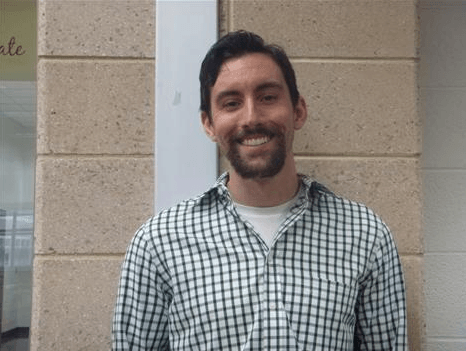MA Student Sean Heron Starts a High School Writing Center

Sean Heron, a student in the online MA program with a specialization in English teaching, started a writing center at the high school in Virginia where he is a teacher. Sean generously agreed to an interview about the writing center.
Please tell us a bit about yourself!
This is my 8th year in public education. Though I majored in history as an undergraduate, I have spent my career teaching high school English—the first four years in West Virginia, the most recent four years in Virginia. This August, however, instead of thinking about my teenage students, I’m thinking about babies; my wife and I are expecting twins this month, and we are so excited to begin the exciting (crazy?) adventure that is parenthood.
How did you get involved working with the writing center?
I was a writing tutor as an undergraduate student, so when I learned that my county supported writing centers at the high school level, I naturally jumped at the chance to start one in my building. This will be my third year directing the writing center. In that time, we have experienced tremendous growth; we’ve gone from recruiting tutors sporadically during study hall to offering students a year-long course in which they receive academic credit for the tutoring they complete. Last year, we completed over 1,500 individual and small-group writing tutorials, and I can’t wait to see what year three has in store!
What was the greatest challenge of starting a writing center? How did you overcome obstacles in the process?
In a word: advertising. There is so much going on at a high school—it takes consistent, assertive advertising to make faculty and students aware of (not to mention comfortable with) the service. To address this issue, tutors have advertised in a variety of ways—from posters and word-of-mouth to social media campaigns and faculty/student presentations.
What is your favorite part of writing center work?
Observing writing tutorials—getting the chance to watch my students tutor—is by far the most rewarding part of directing a writing center. The enthusiasm these students have for writing is contagious; the look on a client’s face when they overcome writer's block, or when they learn a new writing skill, is priceless.
How would you describe your “philosophy” for writing center work?
Writing is difficult. Writing is abstract. Writing is difficult because it is abstract. At Rock Ridge, students learn how to leverage their limited time by creating measurable objectives at the start of each session. Not only do these objectives (i.e. create a thesis statement, review errors in MLA format, evaluate effectiveness of textual integration, etc.) provide a sense of focus, but it helps build in clients the metalanguage needed to talk about their own writing. Above all, a measurable objective allows tutors and clients to see the progress they make during a session, as they can compare the work they completed to their original goal. This helps make writing a little less abstract.
What are your main professional goals within your program and beyond?
It was my work in the writing center that led me to Bowling Green State University. I wanted to learn all that I could about how to make students better writers and how to make students learn to love (or at least like) writing. I’m currently completing the MA in English with a specialization in English teaching along with the certificate in college writing. With the credentials and skills acquired in this program, I hope to continue teaching and directing my high school writing center, with the goal of one day teaching or directing a writing center at a community college or four-year university.
Updated: 09/29/2021 04:11PM
